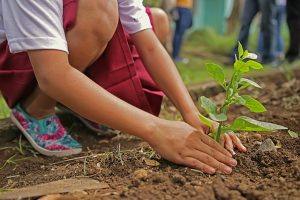It’s the growing season and I’ve just planted my seeds in our garden. What a thrill to watch something so small grow into something so miraculous and productive.
It’s also a week before my kids are out of school for the summer. I take a deep breath and feel a pang of anxiety, wondering if I am ready for them to be home all day long. But I know that we will quickly settle into a summer routine and all will be well.
 More than that, I know that summer is the perfect growing season for my children. It is a season of long stretches of unscheduled time. There are fewer deadlines and more rest. There are no organized sports or homework. It is not a time to listen to complaints of boredom (although I am sure I will hear that, too). Instead, it is the perfect time to plant a seed of potential and watch it grow for the next three months.
More than that, I know that summer is the perfect growing season for my children. It is a season of long stretches of unscheduled time. There are fewer deadlines and more rest. There are no organized sports or homework. It is not a time to listen to complaints of boredom (although I am sure I will hear that, too). Instead, it is the perfect time to plant a seed of potential and watch it grow for the next three months.
In a church talk on Sunday, the speaker discussed a belief of the Church of Jesus Christ of Latter-Day Saints (known as the Mormons). He noted that there are three things that we can take with us after this life is over: our learning and experience, church ordinances, and our family relationships.
Learning lasts. In a book of scripture called the Doctrine and Covenants, it states:
Whatever principle of intelligence we attain unto in this life, it will rise with us in the resurrection. (D&C 130:18)
Learning becomes knowledge. Knowledge authors skill. Skill develops potential. Our children have untapped potential which is both earthly and divine. They can become anything and can do anything.
So how do we help our kids dig up that potential and get it to grow? One experience taught me what grows potential and what kills it.
One summer, I decided to follow a recommendation by a child development researcher who said that kids should become a neighborhood or family “expert” on something. This helps to develop skill and increase confidence.
I decided that it would be our summer project. I asked my children what they wanted to become an “expert” on, and my fourth grader chose computer animation.
Like a gardener who gives a plant basic elements to grow, I stood back and watched in amazement as he downloaded a free 30-day trial for the software, then bought the product with his own money, spent hours on online tutorials and mastered the Macromedia Flash product over the summer. His learning and endurance was shocking to my husband and me. He was willing to sacrifice everything he had to offer to learn this new skill.
The next summer, I asked the kids the same question. This time, I suggested that my son continue his Flash skill and learn to build websites. I bought an online class for him and offered to hire a tutor. I asked him to build me a website. He said he would, then sat down and played computer games for the next two weeks. Clearly, I had done something to kill the seed of potential.
Like the five elements for a plant — dirt, sun, air, water, and time — I learned that there are also five elements for the growth of potential.
A Supportive Environment (Dirt)
 A supportive home environment is like dirt for potential. Parents don’t create the seed of passion-driven potential, but we can help it grow. Instead of ignoring or putting off the dreams, we can say “yes.” Asking questions and listening seems to be the right approach to get the seed planted at the right depth. Questions like: “What are your interests? Tell me about them.” “How do you want to go about learning that?” “What can you do to help us fit that in to our schedule?” and “How can we help?” work well.
A supportive home environment is like dirt for potential. Parents don’t create the seed of passion-driven potential, but we can help it grow. Instead of ignoring or putting off the dreams, we can say “yes.” Asking questions and listening seems to be the right approach to get the seed planted at the right depth. Questions like: “What are your interests? Tell me about them.” “How do you want to go about learning that?” “What can you do to help us fit that in to our schedule?” and “How can we help?” work well.
Ownership (Sun)
 Ownership is like the sun. Our Father in Heaven knows our need to make choices. Our earthly existence is based on this principle of agency. It is through these choices that we progress. We must remember that our children are doing the learning, not us. When we ask “Don’t you really want to learn about…?” or say “That looks cool. Can I learn it at the same time?” or “Tell me all about it. I want to hear every single detail.” we are standing over them, blocking their light or are asking them to move over because we want to grow. When we encourage them to take ownership, they are in full sun.
Ownership is like the sun. Our Father in Heaven knows our need to make choices. Our earthly existence is based on this principle of agency. It is through these choices that we progress. We must remember that our children are doing the learning, not us. When we ask “Don’t you really want to learn about…?” or say “That looks cool. Can I learn it at the same time?” or “Tell me all about it. I want to hear every single detail.” we are standing over them, blocking their light or are asking them to move over because we want to grow. When we encourage them to take ownership, they are in full sun.
Sacrifice (Air)
 Reaching for their goal by sacrifice is the air they need to grow. When we want it so badly for them that we reach for them or over-help because we don’t want them to fail, we take away their air and smother them. We can give choices and allow them to define their own purpose. Because they have purpose, they will willingly sacrifice time, energy and money to develop their potential. Surprisingly, when they have purpose, it doesn’t seem like sacrifice or work to them.
Reaching for their goal by sacrifice is the air they need to grow. When we want it so badly for them that we reach for them or over-help because we don’t want them to fail, we take away their air and smother them. We can give choices and allow them to define their own purpose. Because they have purpose, they will willingly sacrifice time, energy and money to develop their potential. Surprisingly, when they have purpose, it doesn’t seem like sacrifice or work to them.
Recognize Their Progress (Water)
 When we recognize their progress, it is like pouring water on the seed. It encourages and fosters growth. If we show no interest or say nothing, we are drying them out. When we over-praise and say, “That is the most incredible thing in the world I have ever seen. You are an amazing genius,” we are over-watering and flooding them out, weakening their root structure. When we say, “Wow. Smart thinking. Your initiative is impressive. I am interested in what you are learning. Tell me about it,” we are watering at the right amount.
When we recognize their progress, it is like pouring water on the seed. It encourages and fosters growth. If we show no interest or say nothing, we are drying them out. When we over-praise and say, “That is the most incredible thing in the world I have ever seen. You are an amazing genius,” we are over-watering and flooding them out, weakening their root structure. When we say, “Wow. Smart thinking. Your initiative is impressive. I am interested in what you are learning. Tell me about it,” we are watering at the right amount.
Time
 Just like a plant, potential needs time to grow. They need uninterrupted time to dig deeply into their subject. Summer is ideal. When we are rushed or over-scheduled, they have no time to discover their passion. Likewise, if we offer non-stop entertainment, they will always be distracted. Without time to think, they can never consider or discover their potential. And when we watch over them constantly, it’s like pulling up the plant to see if the roots are growing.
Just like a plant, potential needs time to grow. They need uninterrupted time to dig deeply into their subject. Summer is ideal. When we are rushed or over-scheduled, they have no time to discover their passion. Likewise, if we offer non-stop entertainment, they will always be distracted. Without time to think, they can never consider or discover their potential. And when we watch over them constantly, it’s like pulling up the plant to see if the roots are growing.
With these five elements, our children can grow the seeds of potential. They can grow and learn. Their new skill prepares them for service – they have something they can contribute.
Their new knowledge and skills can be combined with faith in the Lord Jesus Christ to help them achieve both their earthly and divine potential. They can use their skills and knowledge to serve God and their fellow man.
Sheri Dew, former counselor in the Relief Society (Mormon women’s organization), tells us the importance of understanding our potential. We all have a divine mission and purpose, and no one can take our place.
“The Lord knows who we are, where we are, what our mission is, and what we need in order to accomplish that mission. Not only has He known us for a long, long time, He has loved us for a long, long time. We are here now because we are supposed to be here now. No one else can have the influence or do the good that we were prepared and foreordained to have and do. No one else can fulfill our individual missions.” (No One Can Take Your Place, Dew, 207)
This summer, I look forward to seeing something small grow into something miraculous. In my garden and at home, I am looking forward to this year’s growing season.



